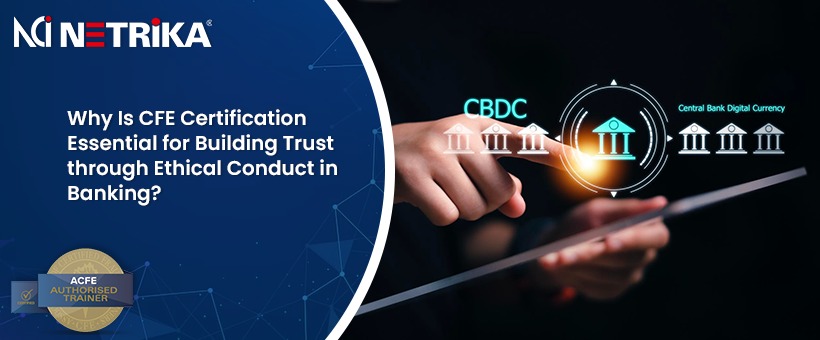News & Events
Why Is CFE Certification Essential for Building Trust through Ethical Conduct in Banking?
- April 3, 2024
- Posted by: marketing@netrika.com
- Category: Blogs

CFE Certification Essential for Building Trust through Ethical Conduct in Banking
The banking sector has always been exposed to fraudulent threats, which not only result in financial losses and reputational damage but also cause clients to lose trust in the system, threatening a country’s economy. To counter such challenges, the world’s biggest and most revered anti-fraud organization, ACFE (Association of Certified Fraud Examiners), offers a CFE certification credential that equips professionals with skills, knowledge, and best practices for preventing fraudulent behavior.
The CFE accreditation is a globally recognized, accepted, and approved professional excellence level that displays verified anti-fraud expertise while also providing professionals with an ethical code of conduct that ensures regulatory compliance, integrity, trust, and accountability.
CFE accreditation is widely recognized as the gold standard for mitigating the global risk of organizational fraud. The CFE Certification promotes a culture of continuous improvement in the banking industry by applying an ethical approach to establishing client trust, identifying, recognizing, and responding to fraud risk, and directing the strategy toward root cause analysis.
Here is how CFE Certification is crucial for building trust through ethical conduct
The banking sector is considered the backbone of a nation’s economy and its ethical operation maintains customer trust through trying times. Ethics is the foundation of a CFE certification. While a certified fraud examiner is expected to apply their abilities and knowledge of fraud detection and prevention by incorporating new technologies, they do so while adhering to the highest ethical standards and prioritizing honesty. This ensures that clients do not lose trust in the banking structure and that the underlying integrity is maintained.
- Certified fraud examiners follow the ACFE code of conduct and maintain professional integrity. Balancing integrity while protecting the banking industry’s security posture is critical for a certified fraud examiner since it ensures the confidentiality of sensitive information. A professional with CFE certification ensures the principles of objectivity and honesty in daily banking operations, as well as for its workers and customers.
- While addressing and investigating fraudulent operations, bank workers may disregard ethical decisions and instead focus on the core problem. This ethical quandary is handled by professionals with CFE accreditation, who are capable of making fair and honest decisions without jeopardizing important information during the fraud investigation process.
- In addition, CFE-certified professionals educate banking industry employees and consumers about the importance of ethical rules of behavior and the consequences of breaking them. A certified fraud examiner’s ethical predisposition ensures that the banking sector stays resilient to fraudulent operations and that customers and stakeholders continue to trust the industry.
A certified fraud examiner combines ethics, integrity, and behavior according to ACFE requirements, taking a comprehensive approach to fraud detection and prevention. They equip themselves with technical skills while adhering to an ethical framework, preserving and enforcing zero tolerance for fraud, and establishing resilience to protect the banking industry, its clients, and the national economy.
How Netrika supports the Banking Sector through Instructor-led CFE Certification Course
Netrika Consulting partners with ACFE to become the only authorized CFE program in India, Netrika. Our instructor-led CFE course is designed to reduce banking fraud on a global scale and restore public trust in the banking sector, often considered the nation’s backbone. Our highly skilled personnel combine the most cutting-edge tools, and best practices with hands-on training to provide a comprehensive strategy for detecting and neutralizing internal as well as external threats.

